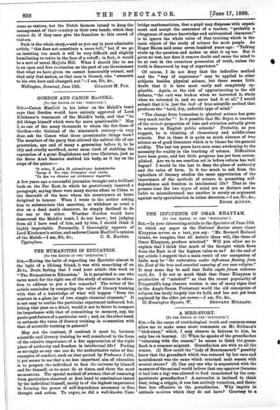THE HUMANITIES IN EDUCATION.
[To THE EDITOR OF THE "SPECTATOR."] SIR,—Having the habit of regarding the Spectator almost in the light of a lifelong friend, it was with something of an Et-tu, Brute, feeling that I read your article this week on " The Humanities in Education." Is it permitted to one who cares much for the right use of the study of science in educa- tion to address to you a few remarks ? The writer of the article concludes by comparing the value of literary training with that of a knowledge of what will happen " from the mixture in a glass jar of two simple chemical elements." It is not easy to realise the particular experiment indicated, but, letting that pass as a detail, would it not be fairer to compare its importance with that of committing to memory, say, the paulo-post future of a particular verb ; and, on the other hand, to estimate the value of literary training in connection with that of scientific training in general?
May not the contrast, if contrast it must be, between scientific and literary training be well considered in the form of the relative importance of a due appreciation of the right place of authority and freedom in intellectual life ? Feeling as strongly as any one can do the authoritative value of fine examples of conduct, such as that quoted by Professor J ebb, it yet seems to me that a no less important aim of education is to prepare the individual to face the universe by himself and for himself, as he must do at times, and those the most momentous. The special method of science, that of reasoning from particulars observed at first hand to conclusions tested by the individual himself, surely is of the highest importance in forming the power of self-dependence necessary to free thought and action. To argue, as did a well-known Cam-
bridge mathematician, that a pupil may dispense with experi- ment and accept the assurance of a teacher, " probably a clergyman of mature knowledge and unblemished character," is to ignore the whole value of that training which is the main object of the study of science for most people. As Roger Bacon said some seven hundred years ago : " Talking shuts up the question and makes us shut it up too. But it gives no test, nor does it remove doubt and cause the mind to be at rest in the conscious possession of truth, unless the truth is discovered by way of experience."
Of course, I do not deny that the inductive method and the "way of experience" may be applied to other subjects besides physical science, but there seems little doubt that it is here most easily and completely ap- plicable. Again, at the risk of approximating to the old defence, "the cart was broken when we borrowed it, whole when we returned it, and we never had it at all," I would submit that it is just the lack of true scientific method that produces the " hard, dry, unfertile type of mind.'
"The change from humanism to physical science has gone very much too far " Is it possible that Mr. Bryce is unaware of the minute proportion of time and attention actually given to science in English public schools ? Probably, as you suggest, he is thinking of elementary and middle-class schools. But in these it is quite as much absence of true science as of good literature which is to blame for the general aridity. The last ten years have seen some awakening to the necessity for reality in the teaching of science. Difficulties have been great, and but little progress has yet been accom- plished. Are we to see reaction set in before reform has well begun? I would be the last to deny the place of authority and the value of form. Is it too much to ask from the upholders of literary studies the same appreciation of the importance of the methods of science in promoting self- dependence and freedom in intellectual life? That at the present time the two types of mind are so distinct and so liable to misunderstand one another is surely an argument against early specialisation in either direction.—I am, Sir, &c.,
EDITH AITKEN.






































 Previous page
Previous page